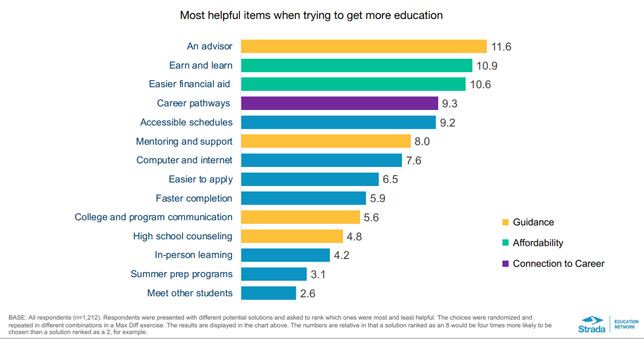Worries and Financial Pressure Major Disruptors of College Plans
- By Dian Schaffhauser
- 09/27/21

Source: "Reconnecting Recent High School Grads: Perspectives and Solutions" from Strada
Over a third of Americans changed their plans for education as a result of the pandemic, with Black and Latinx students more likely to do so than White students. According to newly released data, while 33 percent of White students considered less expensive programs, 40 percent of Black students and 36 percent of Latinx students did so. And even as 29 percent of White students chose schools closer to home, 37 percent of Black students and 33 percent of Latinx students did the same.
The research was undertaken by Strada and Heart+Mind Strategies, to understand what is needed to reconnect recent high school graduates with their college dreams. Strada is a national organization that works on researching and linking education and career. In April and May 2021, researchers surveyed 1,212 high school grads, 52 percent from the class of 2020 and 48 percent from the class of 2021. They also held online discussions and performed one-on-one interviews with a small group of students.
The study found that "disrupted" Black and Latinx students went further in the college application process before disconnecting. For example, while half of White students (51 percent) and Latinx students (50 percent) conferred with a counselor by phone, online or in-person, 58 percent of Black students did so. And while just 39 percent of disrupted White students had applied to a college or some other post-secondary program, 47 percent of Latinx and 48 percent of Black students did. Almost two in five Black students (38 percent) received an acceptance letter, compared to three in 10 Latinx students (32 percent) and White students (29 percent).
Also, more disrupted Latinx and Black students applied for financial aid (40 percent and 38 percent, respectively) than White students (28 percent) before changing their minds.
The primary reason these disrupted students chose not to get more education at this time in their lives was because of "feelings of stress, anxiety and uncertainty," expressed by almost two in five respondents (39 percent). A quarter (26 percent) referenced financial pressures. Just 2 percent mentioned that the schools and programs weren't providing "the kind of experience I want anymore"; and 1 percent said they lacked "access to the technology or internet needed for online education."
To understand what would be most helpful to them when pursuing more education, survey participants were presented with different potential solutions and asked to rank them. Having access to an adviser came out on top, followed in short order by career-oriented work experiences ("earn and learn") and easier financial aid.
Researchers reported that lower-income disrupted students were far more likely to say it had become "more difficult to find information and guidance" during the pandemic. For example, 61 percent of respondents who were low-income found it harder to find information about how to pay for their college education compared to 45 percent of non-low-income students.
Also, while nearly seven in 10 people agreed that getting more education would help them "get a good job," just 45 percent said it would be worth the cost.
Among its conclusions, Strada advised colleges to open up greater access to "mentors, peers and people's stories about navigating career paths" and to help students "discover their own learning needs and values and promote multiple pathways to postsecondary and career success."
The research was delivered during a presentation by the Ronald Regan Institute. A recording of the full proceedings has been posted on YouTube. The portion of the presentation that covered the data findings begins at 36:55.
About the Author
Dian Schaffhauser is a former senior contributing editor for 1105 Media's education publications THE Journal, Campus Technology and Spaces4Learning.